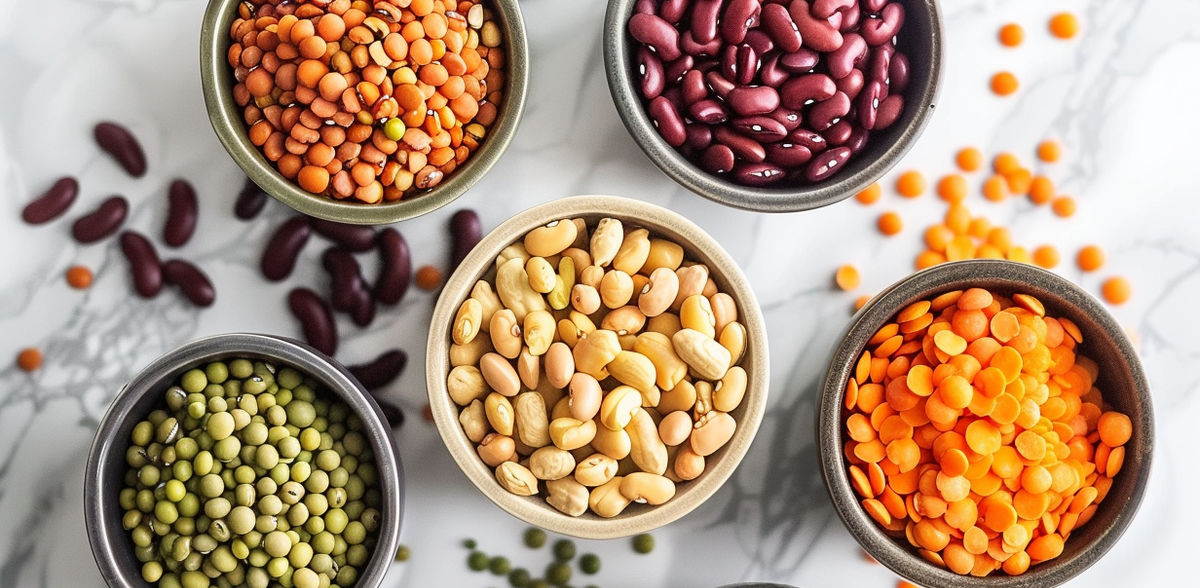Smart Protein Conference: It's all about the legume
Why the EU needs an action plan for plant-based food - and Denmark is a role model
Advertisement
In Berlin, the EU-funded Smart Protein project has summarized findings from four years of research into plant-based foods of the next generation: The European Union must find new ways to direct the enormous resources of its Common Agricultural Policy (CAP) - away from emission-intensive animal husbandry and towards the production of climate-friendly food. It could learn a thing or two from Denmark.
There was a lot going on at the Kulturbrauerei in Berlin's Prenzlauer Berg district on May 24, 2024: Fraunhofer IME and Naturland as well as legume experts such as Roland Beans GmbH and Donau Soja, among others, had announced their attendance at the final conference of the Smart Protein project. Scientific teams from the universities of Bolzano, College Cork, Ghent and Udine were also present. This attracted over 100 conference participants. "Manufacturers in particular did not want to miss out on the conclusion of the Smart Protein project," observed Jens Tuider, International Strategic Director at the nutrition organization ProVeg, which hosted the conference.
Applied knowledge for the whole of Europe
Under the title Smart Protein, a consortium of 32 institutions from 14 countries has provided expertise from plant breeding to product manufacturing since 2020 and examined the diversity of sustainable protein sources from all angles. The results of the project include 24 scientific articles, four market and consumer studies, a policy brief with political recommendations and, last but not least, 13 fact sheets for farmers on the regional cultivation of quinoa, lentils, field beans and chickpeas. Nine online seminars summarize what has been learned and are available as recordings.
"The Smart Protein project has consistently pursued an application-oriented and international approach - knowledge for the whole of Europe that can be implemented directly," explains Tuider. The nutrition organization contributed in particular to the market and consumer studies and the political recommendations - and disseminated the findings across Europe. This was well received: The country-specific consumer studies alone now have more than 1,300 downloads.
The EU lacks a targeted strategy
What can be clearly deduced from the project work is the lack of a targeted EU strategy to promote plant-based food. Yet the food system is a powerful lever for reducing greenhouse gas emissions. Consumers seem to have understood this better than their political representatives.
The majority of people in Europe state that they are now actively reducing their meat consumption. Across Europe, the proportion is 51%.1 In Germany, it is as high as 59%, 8 percentage points more than in 2021.2 The consumption figures from the Federal Office for Agriculture and Food confirm this trend: per capita meat consumption in Germany has fallen by 15% since 2018 to a historic low of 51.6 kilograms.3
The Common Agricultural Policy (CAP) of the European Union (EU) subsidizes 80 percent of animal-based foods, which cause particularly high greenhouse gas emissions.4 5 The largest subsidies relate to meat and dairy farming.6 Animal agriculture is responsible for around 70 percent of agricultural emissions in Germany.7 A ray of hope in the sky: for the first time, the federal budget has allocated 38 million euros for 2024 to promote plant-based, precision-fermented and cell-cultivated proteins and the sustainable conversion of agriculture.
In contrast to the EU's "Farm-to-Fork" strategy, the amount for the promotion of plant-based foods remains low. The farm-to-fork strategy requires agriculture to produce plant-based foods on European soil. The comparatively low amount of funding is contrary to the goal of planning security for farmers, the national nutrition strategy and, not least, the recommendations of the German Nutrition Society (DGE).
There is something exemplary in the state of Denmark
At the end of last year, the Danish government introduced an action plan for plant-based foods. "The EU's agricultural policy would do well to follow the Danish example," explains Tuider. Like Germany, Denmark has a large animal-based agricultural sector with high greenhouse gas emissions.
The Danish action plan now provides for comprehensive strategic measures to strengthen the plant-based sector: Plant-based consumption in public canteens, targeted training of skilled workers, suitable export activities, the areas of production, processing and agricultural raw materials as well as research and development are all taken into account.8 9 As a result, the action plan could even prove to be a job engine: If Denmark were to achieve a 1 to 3 percent share of the global market for plant-based foods, an estimated 27,000 new jobs would be created. That would also be a good prospect for Germany.
____________
Sources
1 Smart Protein Project (2023): Evolving appetites: an in-depth look at European attitudes towards plant-based eating. Online at: https://smartproteinproject.eu/european-attitudes-towards-plant-based-eating/
2 Smart Protein Project (2023): Evolving appetites: an in-depth look at attitudes towards plant-based eating, German Market. Online at: https://proveg.com/de/wp-content/uploads/sites/5/2023/07/ProVeg_Smart-Protein-Report_Germany_2023.pdf
3 Federal Office for Agriculture and Food (2024): Per capita consumption of meat falls below 52 kilograms, published on 04.04.2024. Online at: https://www.ble.de/SharedDocs/Pressemitteilungen/DE/2024/240404_Fleischbilanz.html
4 Kortleve, A. J., J. M. Mogollón, H. Harwatt et al. (2024): Over 80% of the European Union's Common Agricultural Policy supports emissions-intensive animal products. In: Nature Food 5(4), 288-292. doi:10.1038/s43016-024-00949-4
5 Kortleve, A. J., J. M. Mogollón, H. Harwatt et al. (2024): Over 80% of the EU's farming subsidies support emissions-intensive animal products - new study. The Conversation. Online at: https://theconversation.com/over-80-of-the-eus-farming-subsidies-support-emissions-intensive-animal-products-new-study-226853
6 Kortleve, A. J., J. M. Mogollón, H. Harwatt et al. (2024): Over 80% of the EU's farming subsidies support emissions-intensive animal products - new study. The Conversation. Online at: https://theconversation.com/over-80-of-the-eus-farming-subsidies-support-emissions-intensive-animal-products-new-study-226853
7 Federal Environment Agency (2024): Agriculture's contribution to greenhouse gas emissions, published on 06.05.2024. Online at: https://www.umweltbundesamt.de/daten/land-forstwirtschaft/beitrag-der-landwirtschaft-zu-den-treibhausgas
8 AgriFoodTure (2021): Roadmap for sustainable transformation of the Danish agri-Food System. Online at: https://agrifoodture.com/wp-content/uploads/2022/09/agrifoodture_roadmap_2022.pdf
9 Ministry of Food, Agriculture and Fisheries of Denmark (2023): Danish Action Plan for Plant-based Foods. Online at: https://fvm.dk/fileadmin/user_upload/Dokumentation/Danish-Action-Plan-for-Plant-based-Foods.pdf
Note: This article has been translated using a computer system without human intervention. LUMITOS offers these automatic translations to present a wider range of current news. Since this article has been translated with automatic translation, it is possible that it contains errors in vocabulary, syntax or grammar. The original article in German can be found here.






























































